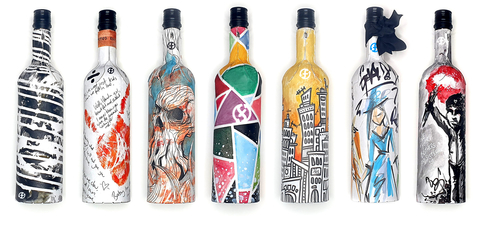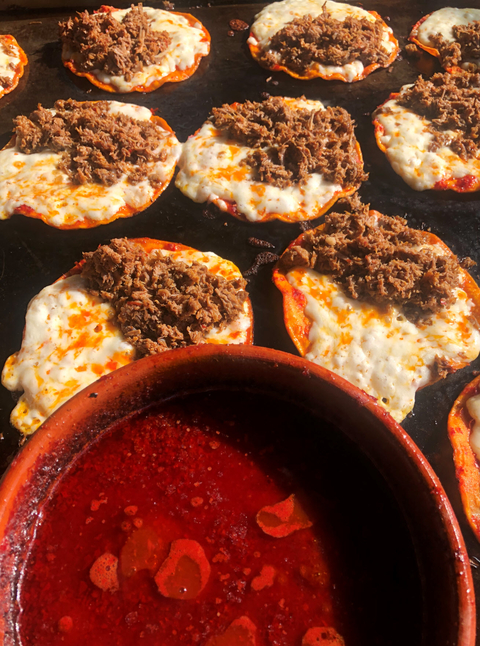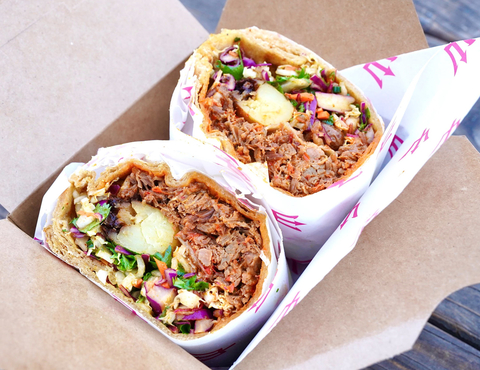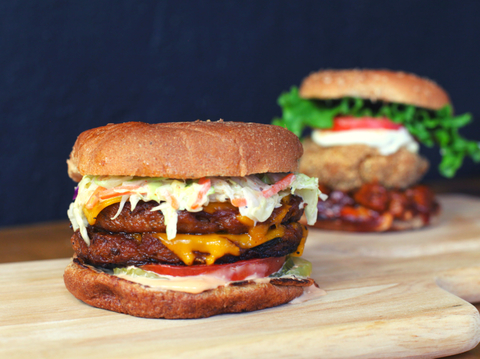af&co., a leading boutique restaurant and hospitality consulting firm, and Carbonate, a creative services and brand communications agency, released their annual hospitality trend report. Always a resource for anticipating market demand and consumer expectations, this year’s report, Do The Hustle, is particularly insightful, analyzing the industry changes beyond the COVID-19 shut-downs and looking forward to how each will continue to affect business in the coming years.
The title of the report, Do The Hustle, reflects the incredible energy, stamina and creativity hospitality leaders have adopted this year, and how nimble they will continue to be in 2021. Candace MacDonald, co-founder and managing director of Carbonate cites the “high of creativity” and drive behind so many in the industry as reason for cautious optimism, as well as inspiration for us all.
This hustling spirit is exemplified by restaurants embracing completely different business models from drive-in movies to grocery supplies in efforts to serve their communities and boost revenue, and by passionate chefs creating pop-up restaurants, or offering items for special order delivery and more, often developing incredibly personal menus featuring under-represented cuisines and communities.
Disruption & Acceleration
While it often feels like our world was overturned this year, many of the underlying trends shaping business and hospitality were already well underway; the pandemic merely accelerated them. Delivery, ghost kitchens and virtual brands were already well established and growing before they became a necessity. Liquor laws changed during this time to allow alcohol sales via delivery, allowing restaurants and bars to increase check averages with drink purchases and offering the opportunity to upsell. Would you like a craft cocktail delivered with that?
Movement towards alternative animal-based products was already a booming industry, which continues to grow each year with new developments and products, embracing new technologies to make non-animal based alternatives to meat, fish and dairy more accessible, affordable, and most importantly more delicious. Even bars have embraced this ethos, playing with aquafaba (the liquid from a can of chickpeas) to replicate the texture of egg-whites in drinks and using nut milks or coconut milks instead of dairy where applicable.
Equality & Ecology
The recent scandal in the Court of Master Sommeliers provides yet another example of the widespread issues the industry faces. Some bars and restaurants are responding by highlighting women winemakers. The same is happening with wine lists showcasing minority or Black owned wineries.
On the ecological front, earlier this year New Belgium’s Fat Tire Amber Ale became the first carbon neutral beer available nationwide and Johnnie Walker is expecting to launch 100 percent plastic-free packaging next year. Expect more brands to follow suit. We’re also very excited by new paper wine bottles by Frugalpac made of 94 percent recycled paperboard. Wineries have long touted various environmental labels, but beverage directors and sommeliers have to educate themselves enough to sort through the empty claims and the ones that hold weight.

The same food waste issues that apply to kitchens apply equally to bars; what do you do with leftover egg yolks from pisco sours? Or the 30 lemon peels leftover from squeezing lemons? Some forward-thinking bars have embraced a zero-waste ethos and are making sure they are getting the most out of every ingredient, turning lemon peels into preserved lemon rind or making a syrup with the peels.
Honor Roll: 2021 Hottest Foods, Cuisines & Drinks
Although the report focuses primarily on larger themes that are applicable to most restaurants and food service retailers, a few specific foods and cuisines are highlighted for special mention. Quessabirria, a griddled crispy edged, molten cheese and beef (or lamb) stew filled taco served with chili laced consome on the side took top position as the Food Trend of the Year. The dish is perfect for this moment: comforting, made from inexpensive ingredients and a panoply of flavors and textures.

Even if Chinese-American cuisine was Cuisine of the Year, the af&co./Carbonate team highlighted several other cuisines on the rise, noting in many cases that they may be rising in particular regions of the country but have not yet reached a national audience, or that they are still rising but have not yet reached the mainstream. These Cuisines On the Rise include: Afro-Carribean, like Bridgetown Roti with their Patties and Red Pepper Goat Roti, Singapore/Malay, like Claw of Mantis or Dabao Singapore, regional Indian, and Jewish deli fare.

Los Angeles, Calif.’s Bridgetown Roti offers a Red Pepper Goat Roti (Photo by: Chris Ryan).
Regardless of cuisine, don’t be surprised to find a plant-based restaurant specializing in it, because as the report points out, plant-based eating is now so mainstream that we are finding restaurants that specialize in specific cuisines not normally associated with the movement, including Italian, Mexican, Carribean, Southern, Soul food, and tacos. Examples include: Shadobeni’s plant-based Trinidadian street food Buss Up Shut or soul food from Souley Vegan’s Louisiana style comfort food in Oakland, Calif.

In a nod to the past, hot cocktails are the Drink Trend of the Year. With so much of the nation shifting towards outdoor socializing, dining and drinking due to both local regulations and safety precautions, hot cocktails are a natural. But this also means that bars need to think beyond the Hot Toddy and Irish Coffee to create unique and enticing hot cocktails to keep guests excited and coming back for more, not just to keep their hands warm.
A Shift in Business Models: Off-Premise and DTC
With restaurant dining rooms, bars, and offices shut down for months around the country, there has been a profound shift in cooking and buying habits. Restaurant suppliers who were forced to quickly pivot at the beginning of the pandemic with the sudden closure of restaurants have found a market in online consumer sales, offering consumers incredible access to restaurant quality ingredients.
Wineries had to go this route as well, and the ones that have successfully made this change will likely continue in this direction. Likewise, wine clubs are having a heyday; taking over the role of server or sommelier to provide trusted wine advice and guide you towards a new wine discovery not to mention save you from going to the store. Now wineries, retail wine shops, and restaurants are all offering wine clubs in efforts to provide a steady stream of dependable sales. Not that this trend is limited to wine either, a number of local and national cocktail clubs have adopted the same model. Examples include: SF Cocktail Club in San Francisco or Shaker & Spoon available nationwide.
Similarly, canned cocktails had already begun to take hold prior to the pandemic with a few entries in the retail market. Now with many states relaxing liquor laws to allow restaurants and bars to earn money by selling cocktails to go, we are expecting to see a huge shift in restaurant/bar retail beverage sales. This will include canned and bottled cocktails both in single portion sizes and larger formats fit for a crowd as well as assemble yourself cocktail kits which include necessary instructions and ingredients but the mixing happens at home. Smuggler’s Cove (San Francisco, Calif.) offers some of their best cocktails canned and Curio (San Francisco, Calif.) offers cocktails to go both bottled in single serving sizes or by the growler.

Smugglers Cove Canned Cocktails (Photo by: Martin Cate)
This push to off-premise forced restaurants to think beyond solely delivery and take-out in efforts to boost sales. Some created meal kits or sold pantry items, providing consumers, many not accustomed to cooking at home seven days a week, with time saving ingredients, cooking instructions, and hard to find pantry staples. This trend will continue long-term as consumers have become accustomed to using restaurants in this way and restaurants continue to need additional revenue sources to offset lower capacities in dining rooms and make up for previous losses. Examples include Canela (San Francisco, Calif.) selling paella kits to go or Gott’s Roadside (multiple locations, Bay Area, Calif.) introducing a line of retail sauces.
Many restaurants will also pursue opportunities with virtual brands, operating a second restaurant concept, often with a lower price point, out of the same space; thus increasing revenue potential while keeping fixed costs fixed. Examples include One Market’s (San Francisco, Calif.) Mark & Mike’s Jewish deli concept. Likewise, last month Chicago’s Lettuce Entertain You and bar Three Dots and a Dash partnered to launch a virtual cocktail bar called Gin & Juice selling DIY cocktail kits with ingredients, tools, measuring equipment and instructions to make and portion their drinks.
While 2020 was a very challenging and emotional year, it brought out creativity and community support at incredibly high levels that will continue to drive success in the year to come.
To see the complete hospitality trend report visit CarbonateGroup.com/trends-2021.
Author the Author: Perhaps not a surprise given that her name was inspired by a restaurant, Leith Steel entered the culinary realm upon graduating Cornell University and spent the next five years in restaurant kitchens in the United States and Europe. She joined af&co. as the fourth employee, where she managed many notable restaurant accounts and orchestrated a number of opening public relations programs. Before joining Carbonate, she lived in Italy for six years, managing marketing for a luxury real estate agent in Chianti, helping open and run a boutique eight room airbnb in Florence and leading private food & wine tours in Chianti. With more than 15 years in the eno-gastronomic industry, Steel brings a depth of perspective that allows her to easily translate serious culinary concepts into ideas that resonate with a wide variety of audiences.
